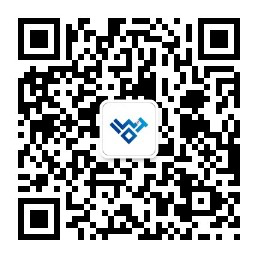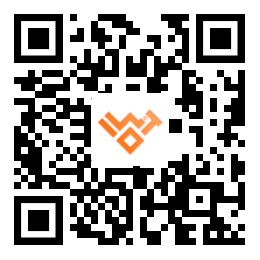Internet of things industry developing at speed in Wuxi
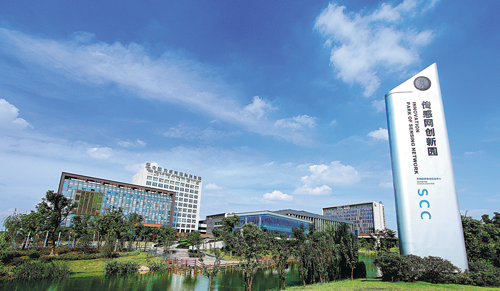
The Innovation Park of Sensing Network in Wuxi, East China's Jiangsu province, is an area that promotes the city's internet of things industrial development. CHINA DAILY
More than 3,500 companies specializing in sector have based themselves in the city
With more than 10 years of development in the internet of things, Wuxi in East China's Jiangsu province has made marked achievements in the industry.
In 2009, Wuxi was approved to build the national sensor network innovation demonstration zone by the State Council, a milestone for the city to take a leading role in IoT construction.
Since the 12th Five-Year Plan (2011-15), the IoT industry in Wuxi has maintained an average annual growth rate of more than 20 percent, official data showed.
In 2020, the revenue of the IoT industry reached 313.6 billion yuan ($48.46 billion). The number of IoT companies was 3,657. Together they have formed an industrial chain integrating chips, sensor equipment, communication, intelligent hardware and application services.
Wuxi Sencoch Semiconductor, also known as XGZ, is located in the IC Design Center in the city's Binhu district. Founded in 2010, XGZ is a company that has grown with Wuxi's IoT development.
"Wuxi has witnessed great changes in the IoT sector, and the industrial chain has improved over the past 10 years," said Hua Tiankai, administrative director of XGZ.
The city boasts several advantages in having a complete industrial chain; it has strong semiconductor manufacturers such as China Resources Microelectronics, according to Hua.
Benefiting from cooperation with CR Micro, a micro electronic product and semiconductor manufacturer, XGZ has become more competitive in developing its micro-electro-mechanical systems sensor chips in Wuxi, Hua said.
According to the company, XGZ now has more than 40 MEMS patents, including eight invention ones.
For a company engaged in development and research, skilled talents are in high demand among businesses, Hua said.
Over the past few years, the Wuxi government has provided businesses with support including housing allowances, talent attraction and venue leasing in terms of their development status, Hua said.
XGZ has asked for more sites to hold its final test for semiconductor products. A new site will be arranged by the end of this month, Hua said.
Since 2019, the company's sales volume has doubled and its output value is expected to reach 80 million yuan this year, according to Hua.
"We developed and designed chips by ourselves. The business environment in Wuxi helps us to develop a whole product portfolio," he said.
To date, the city is home to a total of 78 listed IoT companies.
In addition, there are 25 IoT projects that have been approved as national-level brands.
In March, Wuxi's IoT sector was included among the first batch of national advanced manufacturing industrial clusters. It is the only IoT cluster to be included on the national list.
Constructed in 2017, Xuelang town is an IoT demonstration area, as part of efforts to promote the development of the industrial internet and manufacturing.
Covering a spanned area of 3.5 square kilometers, the town has initiated manufacturing based on internet technology. It is home to major projects covering healthcare, big data and semiconductors as well as industrial internet platforms such as Xuelangyun.
With an aim to build itself into a cradle of the digitization of manufacturing, the town has been nominated as an example of the development of the digital industry.
"Developing the digital economic industry means to start from scratch for the town, as it had no relevant industrial basis," said Wang Feng, founder of Xuelangyun.
The town has introduced potential innovation teams and cultivated them into industrial platforms, Wang said.
This has formed an industrial ecosystem that collaborates with upstream and downstream partners to attract more innovative businesses and thus create an industrial cluster, he added.
As the IoT technology develops, the city has played a demonstration role in smart applications. IoT technology has been applied in fields such as environmental protection, transportation and medical health.
In 2018, the world's first city-level internet of vehicles LTE-V2X (vehicle to everything) application project was launched in Wuxi. It was implemented in Wuxi by relevant parties including China Mobile, Huawei and the Traffic Management Research Institute of the Ministry of Public Security.
The project is designed to cover central downtown, city expressways and intercity expressways. It spans about 350 sq km in the city, covering 600 intersections.
In 2019, Wuxi was approved by the Ministry of Industry and Information Technology as the first national-level pilot area for the internet of vehicles in Jiangsu. The pilot area has been constructed with an aim to improve the IoV functions and applications in the city.
The pilot area helps to gather industries and benefits those such as communication equipment, network operators and computing, local officials said.
Recently, the pilot area granted intelligent networked automobile road test licenses to companies including Audi, QCraft, JD-Link and JD.
In addition, the Binhu and Xinwu districts have conducted tests of the internet of vehicles. This included public transportation, parking services and vehicle management in their tourism and core areas, according to local officials.
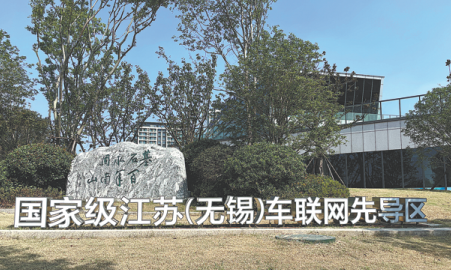
Wuxi is approved as a national-level pilot area for the development of internet of vehicles technology. CHINA DAILY
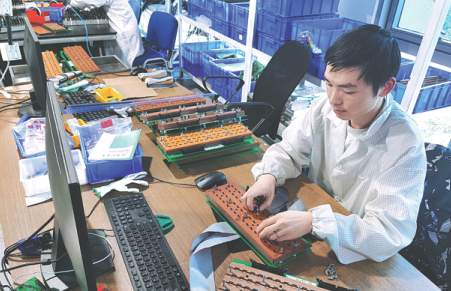
An employee at Wuxi Sencoch Semiconductor tests a product. CHINA DAILY

